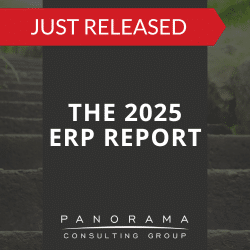While a new ERP system may drive many business benefits, how do you ensure it continues to do so for years to come? The answer lies in establishing an ERP center of excellence. Today, we’re sharing what this entails and why it could be the most important step in your ERP project.
Why Build an ERP Center of Excellence?
A center of excellence (COE) is a team that brings specialized skills, training, support and best practices to a given focus area. This effort isn’t isolated to ERP initiatives alone but can also extend to other areas, including project management, business intelligence and IT.
In the ERP sphere, a center of excellence is the team responsible for ensuring continuous improvement long after your go-live date. These are the people who will identify pain points and opportunities for improvement. They’ll also manage system upgrades and oversee continuous end-user training.
A few of the top benefits of building this team include:
- A longer lifespan for your ERP solution
- Reduced long-term reliance on ERP consultants
- Stronger organizational alignment
- Greater flexibility and adaptability
- Improved resource optimization
- Team member accountability
The 2025 ERP Report
72.6% of respondents said they've already deployed AI at their organizations. Learn about AI adoption and other ERP trends by downloading our latest report.
5 Tips for Building an ERP Center of Excellence
Before we dive into how to build this entity, let’s reexamine the reasons organizations implement an ERP system in the first place.
While access to newer, more robust technology is an obvious benefit, it isn’t the leading one. Rather, ERP software is primarily meant to enable process improvement and innovation, allowing you to gain efficiencies as you slough off old practices and legacy systems.
While these new competencies look great on paper, how will your organization support them in the long run? This is when it becomes critical to build up your internal capabilities, so you’re prepared to make the best use of your new system after go-live.
Here are a few ways you can create an ERP center of excellence that ensures post go-live optimization:
1. Define Your Focus
All ERP centers of excellence are designed to help companies achieve continued ERP implementation success. Yet, each one can take on a slightly different focus depending on a company’s unique needs.
Are you primarily interested in preparing employees for new processes and technology by focusing on organizational change management? Do you want to extend and maximize the use of your new software? What about making sure that your master data is effectively managed throughout the transition?
There’s no right or wrong answer, but it’s important to define your areas of focus as soon as possible.
2. Establish Key Roles
Next, you’ll need to define the roles and responsibilities of each person assigned to your center of excellence. The people assigned to these roles should help your organization meet both short-term and long-term goals.
We recommend identifying team members with skill sets that span the following categories:
- Functional
- Technical
- Platform-specific
- Business
The people you select should fully understand not only how the ERP software works, but also how it will help your company meet its goals and objectives.

3. Keep Your Focus Long-term
It’s important to remember that your center of excellence isn’t a flash-in-the-pan IT support function meant to see your company through the earliest days of your ERP rollout.
Rather, it’s designed to serve as a long-term entity that will help your company grow. It’s about actively looking for ways to optimize your processes and technology, so you can set your company up for continued success.
Is your ERP system delivering the benefits you expected? If not, it’s not too late to ensure ERP benefits realization. Set a new timeframe for your goals and make sure it’s realistic. Then, look for new ways to achieve your objectives.
4. Look for Software Optimization
One chief goal of your ERP center of excellence should be identifying opportunities for software optimization. In some cases, this might mean adding additional modules as required, or you may choose to invest in add-on applications or new capabilities, such as predictive analytics.
Upgrading and improving your ERP software ensures it continues to support your company as your business grows. It can also help extend your system’s lifespan, so you don’t need a full “rip-and-replace” five years down the road.
5. Build it Sooner, Not Later
It’s important to build your center of excellence early in your ERP implementation. By doing so, you can fortify your internal teams rather than relying solely on outside consultants for years to come.
Building your team early helps you create a continuous improvement culture that engages employees in process and technology optimization during the ERP selection stage and beyond.
A Firm Foundation for Your ERP Implementation
What better way to ensure ERP success than to establish an internal team focused on achieving it? An ERP center of excellence is an ideal way to get your whole company engaged and invested in project goals. It can also help ensure the solution you choose is well-suited for your needs and designed to last far into the future.
If you need help building your team, our ERP consultants can help. Contact us below for a free consultation.













